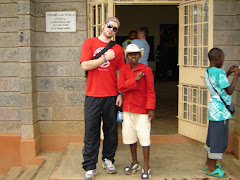
The picture to the left depicts one of the many sacred moments I experienced in Kenya this past summer. We were at Xcel School in the Kibera slum next to Nairobi. This slum is three miles long and a half mile deep. When I visited it this summer, it was estimated that about one million people live in this small stretch of land. Sadly, this slum has been home to much of the tribal violence going on in Kenya over the past month. In the couple of days my team and I spent at Xcel School, we had several moments where we could feel Heaven crashing into Earth. One of those moments happened right before lunch the first day we were there. The school feeds the kids ugali, rice, and beans every day. For many of the kids, that was the only meal they would have all day. Before they are fed, however, they pray together. Each kid, out loud, and in Swahili. Those prayers, prayers of genuine gratitude, impacted our whole team, even though we had no idea what they were saying. Now these kids are not only praying for thanksgiving, but also for peace. The article below originally ran in Baptist Press.
NAIROBI, Kenya (BP)--A group of children runs up a muddy path, drenched from an unexpected downpour. A 5-year-old boy speeds in front of the pack when he suddenly spies the perfect puddle.
He waits until his older sister and friends are almost parallel with him and then practically "cannon balls" to get the biggest splash. He giggles and dashes inside a small, tin shack of a Baptist church as the 8-year-olds squeal and chase after him.
After three weeks of post-election violence, it's good to hear the sounds of children laughing and playing -– especially in the hard-hit slums of Nairobi.
Inside the church, it's wall-to-wall children -– and a sound even more precious than laughter can be heard –- a child's sweet, innocent prayer.
"Father, our country is in trouble. We pray for peace to come," an 11-year-old boy prays. "Protect us, Father. Teach people to love one another and not to fight anymore."
For the last two weeks, children in this small slum area have gathered to pray for their country. The church's pastor says the children started gathering on their own, so he let them in the church. The daily prayer meeting now attracts more than 200 children ranging in age from 3 to 17.
Ever since the children started praying together, the pastor says there have been no deaths, houses burned or even violence in their section of this slum. Adults recite this fact in amazement. The children, however, don't even mention it because it's exactly what they expected to happen.
"Pastor told us that there is power in prayer. He said we can change the country through prayer," 12-year-old Boniface explains. "So that is what we are doing, changing the country."
The children evidence a depth of understanding of the issues surrounding Kenya's post-election chaos.
The 12-year-old prays for President Mwai Kibaki and opposition leader Raila Odinga to sit at one table and talk peacefully. Votes cast in the election for these two candidates are under contention. The two leaders have yet to talk to each other in an effort to bring the strife in Kenya to a peaceful resolution.
Caroline, 16, shows her concern for the 250,000 internally displaced people around the country. She prays they will be able to go to school somewhere and that they feel safe. UNICEF estimates that more than 40 percent of the displaced are children. Parents put their children on trucks headed to the camps for displaced people but stayed behind to protect their houses and belongings. Many sit in camps, unable to attend schools that just opened in mid-January.
Another young boy prays for the people hurting others who are not from the same tribe, referring to reports of ethnic animosity throughout the country. He asks God to help them all be brothers and sisters and one people.
The pastor smiles and whispers to me, "A few days ago that one asked if I knew what tribe he was. I told him no. He didn't know, either. So he told me, 'I think I belong to the tribe of Kenya.'"
When it's time for the "babies" to pray, a fearless 4-year-old clasps his hands and closes his eyes so tight that his entire face scrunches up. "God, people die," he says in prayer. "Please do not let anyone die in front of my house."
More than 600 people have died since elections Dec. 27. The number increases daily as violence and protests continue.
An adult's concluding prayer simply thanks God for the innocent prayers of children and their faith in His answers.
As soon as the "Amen" is said, the church buzzes with little voices and bottled-up energy spurts out freely. Laughing and holding hands, the children rush into the rain and head home.
Even though it's the dry season and rains are not supposed to come for another month, no one complains about getting wet or muddy. The rain is an answered prayer.
The children had prayed about a three-day countrywide protest called by the opposition party. They had asked God to take control and keep people from dying.
Because of the rains, turnout for the protest was much smaller than expected. While there was still a lot of property damage, it was much less than predicted. Death tolls for the week were the lowest since the incidents started.
"See," 7-year-old Natasha whistles through her missing two front teeth. "God answers prayers."
--30--
Sue Sprenkle, an overseas correspondent for the International Mission Board, has been reporting from Africa for 10 years.
May we all learn from these kids to pray for peace, and may we all have a "child-like" faith.







